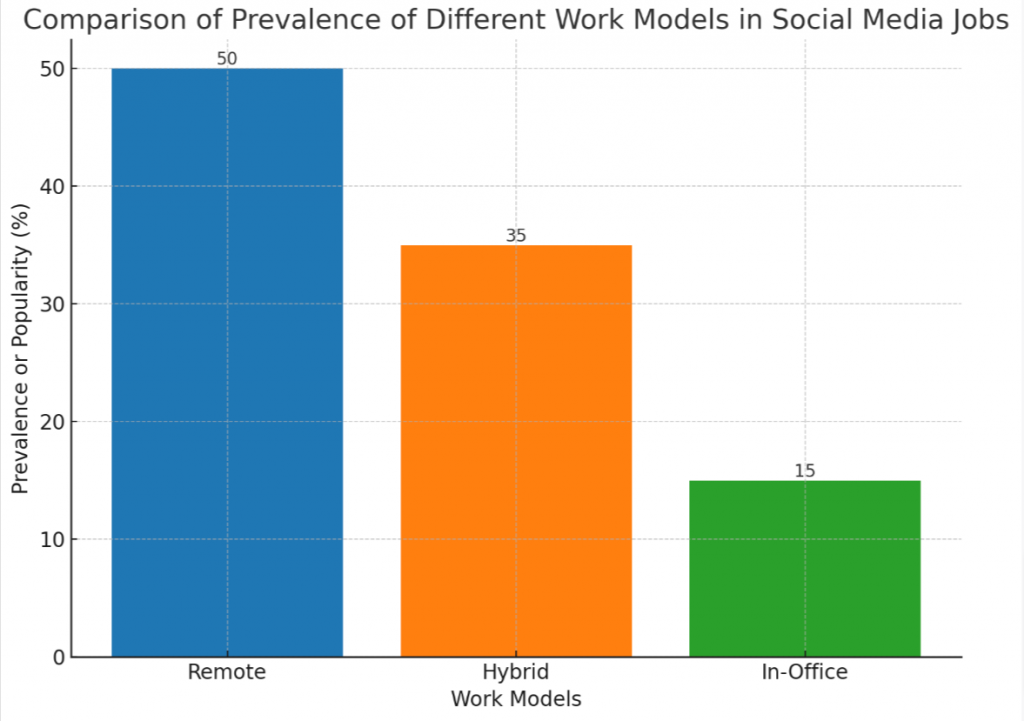Understanding Salary Expectations in Remote Social Media Jobs
Navigating the evolving landscape of remote social media jobs can be a challenge. With an already high demand and increasing prevalence, this trend is reshaping the way digital professionals work.
This blog post will guide you through future predictions for this burgeoning industry, equipping you with key insights to face these changes head-on. Get ready to unfold the future of remote social media jobs!
Key Takeaways
- Remote social media jobs are evolving to include hybrid work models, offering employees the flexibility they crave while promoting innovation and cost savings for businesses.
- Employee well – being is becoming a top priority in remote social media jobs, with companies recognizing that a healthy workforce leads to increased productivity, creativity, and overall business success.
- Freelance platforms are increasingly used by businesses to meet their social media needs, allowing access to a global pool of talent and providing cost-effective solutions.
- Enhanced focus on cybersecurity is essential in remote social media jobs due to the growing importance of technology and online platforms. Protecting sensitive information and ensuring the well-being of remote workers is crucial.
The Evolution of Social Media Jobs
Social media jobs initially revolved around managing platforms and crafting engaging posts. Fast-forward to today, employees in this field don’t just manage social media accounts; they also influence business strategies and drive consumer behaviors.
Roles such as Social Media Managers, Content Creators, Digital Marketing Specialists, and Community Managers became crucial for business operations.
In recent years, remote work options have significantly influenced the evolution of social media jobs. Technological advancements provided tools needed for seamless teleworking experiences.
Companies began investing heavily in these technologies as more workers expressed preference towards the flexibility of working from home contributing to job satisfaction. This trend led to an increase in remote job opportunities within the social media industry that continues at a steady pace today.
The Current Landscape of Remote Social Media Jobs
With the onset of the pandemic, remote social media jobs have exploded in popularity. Companies are increasingly relying on platforms like LinkedIn, Twitter, and Instagram for marketing purposes and need skilled remote workers to manage these accounts.
Prodoscore reports a 47% increase in productivity among such professionals during lockdowns.
The current landscape for these roles is dynamic and evolving rapidly. Roles such as Social Media Managers, Content Creators, Community Managers, and Digital Marketing Specialists are now mostly performed remotely due to technological advancements that allow effective collaboration from afar.
This significant shift has been facilitated by increased communication activities like emailing or chat messaging which saw a notable boost during quarantine periods.
Further reinforcing this trend is Buffer’s 2023 State of Remote Work report indicating that around 91% of respondents enjoyed their work-from-home setup. The demand for flexible job opportunities is also high; McKinsey’s survey revealed that it’s one of the top reasons why people seek new jobs today with nearly 87% expressing interest if offered an opportunity to work remotely.
Future Trends in Remote Social Media Jobs

The future of remote social media jobs is characterized by hybrid work models, a focus on employee well-being, increased use of freelance platforms, and enhanced cybersecurity measures.
Discover the exciting trends shaping the future of this industry!
Hybrid Work Models
Hybrid work models, which combine remote and in-person work, are rapidly gaining popularity due to their capacity to offer employees the flexibility they crave. With these models, businesses can benefit from diverse perspectives and increased innovation while also enjoying cost savings.
However, fostering effective communication and collaboration within a virtual environment can be challenging. To overcome this hurdle, companies need to invest heavily in tools and strategies that encourage teamwork despite the distance.
Growing Importance of Employee Well-being
Employee well-being has surged to the forefront of business strategy, especially in remote social media jobs. Organizations are realizing that a healthy workforce increases productivity, fosters creativity and builds strong company cultures.
In light of the remote work shift due to COVID-19 pandemic, employees need to balance their professional tasks with home responsibilities. This new dynamic shapes how companies approach wellness initiatives and support systems for their teams.
Buffer’s 2023 report showed that flexibility topped as the largest benefit among workers while Prodoscore revealed a 47% hike in productivity during lockdowns thanks to enhanced job satisfaction from such arrangements.
Both studies underscore the paramount role of employee wellness not only for individuals but also for overall business success in this digital era.
Increased Use of Freelance Platforms
Companies are increasingly turning to freelance platforms to meet their social media needs. This trend is driven by the flexibility and cost-effectiveness that freelancers provide.
With the rise of remote work, businesses have access to a global pool of talent, allowing them to find specialized social media professionals who can deliver high-quality work. Freelance platforms also offer streamlined hiring processes, making it easier for companies to connect with freelancers who possess the specific skills they require.
As this trend continues to grow, we can expect more businesses to embrace freelance platforms as a valuable resource for their remote social media jobs.
Enhanced Focus on Cybersecurity
Growing importance of technology and online platforms has led to an enhanced focus on cybersecurity in remote social media jobs. As video conferencing technology becomes essential for seamless remote work, there is a clear need for secure communication channels.
With the widespread adoption of broadband internet enabling video conferencing and remote work, it also brings security risks that must be addressed. Many companies are now operating out of coworking spaces to accommodate their remote workforce, which necessitates the establishment of secure network connections.
Remote work requires heightened cybersecurity measures to protect sensitive information and ensure the well-being of remote workers.
The Role of AI and Machine Learning in Social Media Jobs
AI and machine learning are playing an increasingly important role in social media jobs. With the potential to revolutionize how businesses use social media, AI-powered chatbots have emerged as a valuable tool for automating customer service interactions on social media platforms.
These intelligent bots can quickly respond to inquiries, provide support, and even handle basic transactions, freeing up human employees to focus on more complex tasks. Additionally, AI can analyze vast amounts of social media data and extract meaningful insights that inform business decisions.
By identifying trends in consumer behavior or sentiment analysis, AI enables companies to optimize their marketing strategies and tailor their content to better engage with their target audience.
In this way, AI and machine learning technology are empowering social media professionals to enhance their performance and deliver more effective results.
Skills and Training for Future Remote Social Media Jobs
To succeed in future remote social media jobs, professionals will need a combination of technical skills and creative capabilities. Here are the essential skills and training required:
- Data analysis: As social media platforms generate vast amounts of data, proficiency in analyzing and interpreting this data will be crucial for understanding consumer behavior, measuring campaign effectiveness, and making informed marketing decisions.
- Digital marketing expertise: A solid understanding of digital marketing strategies, including content creation, SEO optimization, paid advertising, and influencer marketing, will be essential for promoting brands effectively on social media platforms.
- Technical skills: Familiarity with various social media platforms (such as Facebook, Instagram, Twitter), content management systems (CMS), analytics tools, scheduling tools (e.g., Hootsuite), and web design basics (HTML, CSS) will be necessary to manage and optimize social media campaigns.
- Creativity: The ability to create engaging and shareable content across different formats (text-based posts, images, videos) will help capture audience attention and drive engagement on social media platforms.
- Adaptability: With the rapid evolution of social media algorithms and emerging technologies like AI-powered chatbots or augmented reality filters, professionals must stay up-to-date with industry trends and adapt their strategies accordingly.
- Communication skills: Excellent written communication skills are vital for crafting compelling copy that resonates with the target audience on each platform. Additionally, strong interpersonal skills are necessary for building relationships with clients or community members through direct messages or comments.
- Continuous learning: Given the ever-changing nature of the social media landscape, staying curious and actively seeking out new knowledge through online courses, webinars, conferences, or degree programs in digital marketing or social media will be essential for career growth.
The Impact of Remote Work on Company Culture and Collaboration
Remote work has had a significant impact on company culture and collaboration. With employees working from different locations, it becomes crucial for organizations to foster a strong sense of culture and maintain effective collaboration among team members.
Remote work can lead to both positive and negative effects on company culture. On the one hand, remote work allows for greater flexibility and autonomy, which can boost employee satisfaction and engagement.
It also encourages companies to establish more inclusive and diverse workplace cultures by hiring talent from different geographic areas.
However, remote work can also pose challenges in maintaining a cohesive company culture. Without face-to-face interactions, there is a risk of decreased social connections among employees.
This can result in feelings of isolation or disengagement from the organization’s values and goals. To mitigate this, companies need to leverage communication technology effectively.
Regular video conferences, virtual team-building activities, and chat messaging platforms contribute to fostering stronger relationships among remote teams.
Moreover, remote work impacts collaboration within organizations. Collaborating remotely requires strong communication skills as well as trust between team members who may never meet in person.
Companies need to invest in reliable teleconferencing tools that facilitate seamless communication and enable real-time collaboration on projects.
In conclusion, while remote work offers many benefits such as flexibility and increased job satisfaction, it also poses challenges for maintaining company culture and effective collaboration among dispersed teams.
Companies must actively address these challenges by using technology effectively to foster connection among employees regardless of their physical location.
Challenges and Opportunities in Remote Social Media Jobs
Working remotely as a social media professional presents its unique set of challenges and opportunities.
| Challenges | Opportunities |
|---|---|
| Communication can be a challenge, as remote work relies heavily on digital tools for collaboration. | Remote work offers flexibility, which is highly valued by 91% of survey respondents. This can help in attracting and retaining talent. |
| The challenge of building a strong company culture when employees primarily work remotely is recognized. It’s estimated that by the end of 2023, 25% of employees will be in this category. | Remote work allows employees to be part of resilient teams, especially during crises, thereby contributing to public health. |
| Cybersecurity risks can escalate, as remote work has broadened the attack surface for cybercriminals. | With an increased use of freelance platforms, companies can find specialized skills more easily. |
| Physical and mental well-being can be impacted due to isolation or overworking, as boundaries between work and personal life can blur. | The trend towards hybrid work environments can cater to both employee preferences and business needs, offering a balance that promotes productivity and well-being. |
Conclusion
In conclusion, the future trends of remote social media jobs are evolving to include hybrid work models, a focus on employee well-being, increased use of freelance platforms, and enhanced cybersecurity measures.
AI and machine learning will also play a significant role in shaping these jobs. As companies embrace remote work and adapt to new technologies, the demand for social media professionals is expected to rise.
Stay ahead of the curve by acquiring the skills necessary for success in this ever-changing industry.

